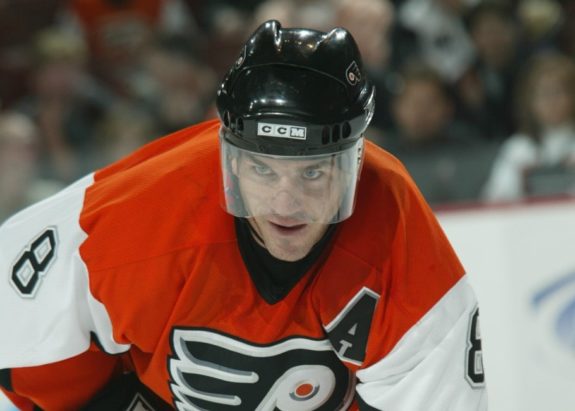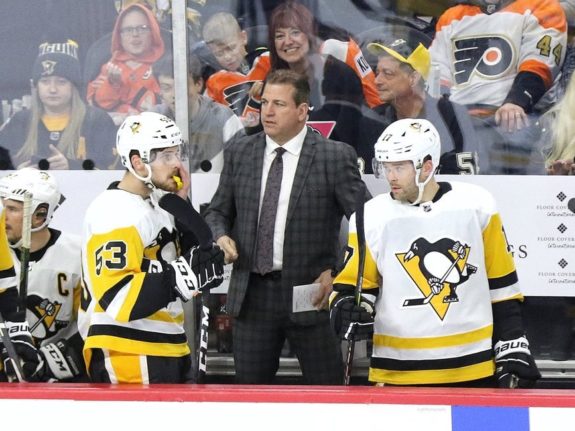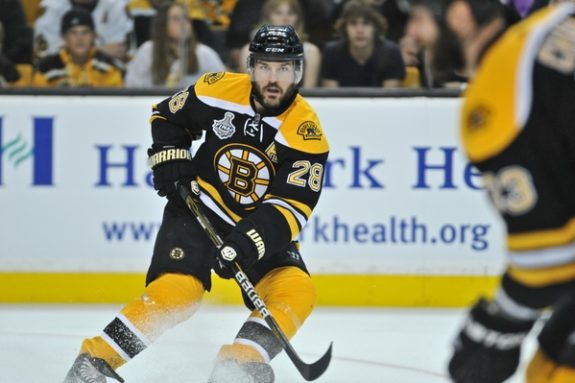Hockey Hall-of-Famer Mark Recchi never met a team he didn’t like… or didn’t like him, which is all the more impressive considering he played for 10 in total. Granted that includes five separate stints in the state of Pennsylvania, two with the Philadelphia Flyers, where he enjoyed the most success, statistically speaking, and three with the Pittsburgh Penguins, where he won the first of his three Stanley Cups.
Related: Mark Recchi and the Hall of Fame Debate
Recchi got drafted No. 67 overall by the Penguins in the 1988 NHL Entry Draft, winning that Cup early on in his career in 1991, the Penguins’ first ever, as a 23-year-old. He led the team during the regular season with 113 points, adding 34 points in 24 playoff games, which trailed only Mario Lemieux (44 in 23), who had been limited to 26 regular season games due to a back injury. His value was clear.
Recchi’s First Stint with Flyers
With that, Recchi got dealt to the Flyers the following season in the first of several blockbuster trades in his career (with Rick Tocchet and Ken Wregget most notably going back to the Penguins). However, with Eric Lindros subsequently getting acquired, Recchi would really have to wait a few more seasons before being traded to the Montreal Canadiens to be “the guy,” which is odd in a sense.

For example, during his first full season with the Flyers, which coincided with Lindros’ rookie campaign, Recchi notched a career-high 53 goals and 123 points to lead the team. In fact, the 123 points are still a single-season Flyers record. Even so, the Flyers failed to make the playoffs with Recchi during his first stint.
As a result, the Flyers can hardly be blamed for trading him to the Habs in early 1995, especially considering the return they got in exchange: He and a third-round draft pick netted the Flyers John Leclair, Eric Desjardins and Gilbert Dionne. After five straight non-playoff seasons, the Flyers became contenders on the strength of the deal and Lindros’ Hart Memorial Trophy-winning 1994-95 season.
With the Canadiens, Recchi did in fact become the arguable star attraction, leading the Habs in scoring that first season, despite playing just 39 of their 48 games. He repeated the feat in 1997-98, besting second-leading-scorer Vincent Damphousse by 15 points in what was the team’s best season of his five in Montreal. The Habs reached the second round for the first time since their 1993 Stanley Cup, coincidentally beating the Penguins, Recchi’s former team, in Round 1.
Recchi’s Second Stints with Flyers, Penguins
Unfortunately for Habs fans, that was as good as it got with Recchi, or more accurately with Rejean Houle as general manager. With Recchi poised to hit unrestricted free agency, the Canadiens traded him back to the Flyers for a relative pittance in 1999, the first of three straight non-playoff seasons for the Habs. There’s probably some correlation.
The “relative pittance” comment is not just due to Dainius Zubrus, the centerpiece of the return for the Canadiens, failing to reach his potential as a former first-round draft pick as a Hab. It’s more so due to Recchi still having so much runway left in his career at that point.

Recchi remained with the Flyers up until the 2004-05 lockout, at which point he had turned 36. No matter. During that second Flyers stint, he put up 365 points in 402 games, rejoining the Penguins in 2005-06, from where he got traded to the Carolina Hurricanes in time for their Stanley Cup run. He still had another stop with the Penguins left him in, re-signing there the following offseason.
Recchi Hangs Them Up After Bruins Cup Victory
Recchi did admittedly get put on waivers by the Pens in late 2007, getting claimed by the Atlanta Thrashers. However, the fact that he went on to score 40 points in 53 games the rest of that 2007-08 season goes to show that, even at the spry age of 40, he had something left in the tank. After all, he still had a cup of coffee with the Tampa Bay Lightning to go the next season, eventually getting dealt to the Boston Bruins, where he spent the rest of his career, fittingly retiring after helping them to win the 2011 Stanley Cup.
Recchi spent two-plus seasons with the Bruins, literally about a tenth of his 22-season career. Retiring as the NHL’s 12th-leading scorer, Recchi obviously enjoyed greater individual success elsewhere, as this time around he played less of a front-and-center role on teams led by the likes of a young Patrice Bergeron and younger (than him) Zdeno Chara.

Nevertheless, he scored 48 points that 2010-11 regular season, proving he could still contribute, while his three goals in the Stanley Cup Final against the Vancouver Canucks made him the oldest player, at 43, to get even one. All in all, even if it came in a jersey with which few fans associate him, playing a role he wasn’t used to, his third and final championship may very well define his career the best. Despite the many different teams, he had what they call lasting power.
